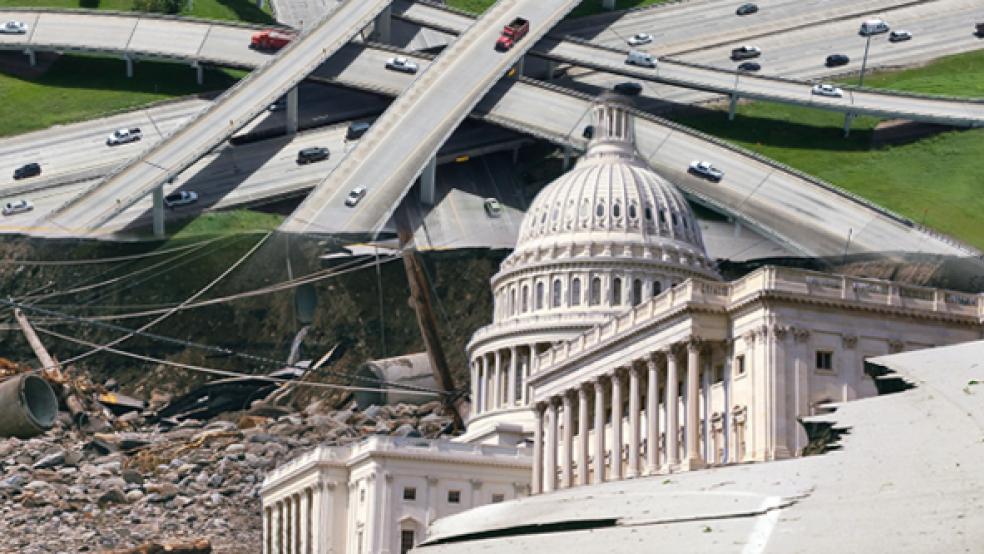The latest word from Capitol Hill on the fate of the long-suffering drive for new federal highway and infrastructure legislation is not encouraging: Republican and Democratic lawmakers are very likely to kick the can down the road yet again this summer.
Key Republican and Democratic senators -- including Senate Environment and Public Works Chair James Inhofe (R-OK) and ranking Democrat Barbara Boxer of California -- reached a tentative agreement late last month on the broad outlines of a new six-year, roughly $575 billion transportation bill aimed at addressing the country’s crumbling infrastructure and need for more construction jobs.
Related: Senators Move Towards a Big Infrastructure Deal
After extending the existing legislation nearly three dozen times before, the Senate and House appeared to be gearing up for finally breaking a nearly two-year impasse by a working deadline of July 31.
But Sen. Ron Wyden of Oregon, the ranking Democrat on the Senate Finance Committee, and Sen. John Hoeven (R-ND) signaled Wednesday during a joint appearance at the Bipartisan Policy Center that Congress most likely this month will pass another short-term extension of existing highway legislation through the reminder of the year. That will keep federal aid flowing for state and local highway, bridge and other infrastructure projects, but it won’t solve the states’ overarching problem of uncertainty and confusion over future policy.
Wyden said the big problem is finding consensus on tax legislation to underwrite a new long-term federal transportation program and prop up the near-bankrupt Highway Trust Fund, which has been largely financed over the years with revenues from the 18.4-cent per gallon federal gasoline tax. He noted that House Speaker John Boehner (R-OH) and other GOP leaders have ruled out an increase in the gasoline tax, while an alternative approach to raise money for highways through corporate tax reform is complex and highly controversial.
Hoeven, a former North Dakota governor and major player on highway issues, agreed that “it will be very difficult to muster the votes to raise the gas tax,” especially from lawmakers from the Midwest, where constituents do a lot of driving and would perceive a gas tax hike as directly targeting them. With so many unresolved tax and spending issues, Hoeven and Wyden seemed prepared for further delays in rewriting the nation’s transportation laws.
Related: How Tax Reform Could Help Save U.S. Infrastructure
“I think the likelihood is that we will probably see an extension to the end of the year, passed before [Congress goes out] this month,” Hoeven said. “That can be viewed in one of two ways. That’s bad because we would like to get a six year bill right now … But we’re at one of those critical points both in terms of infrastructure and tax policy where I think the pressures are coming together.”
Inhofe and Boxer last month unveiled comprehensive legislation known as the DRIVE Act that would give state and local governments “the certainty and stability” they need to improve and develop the nation’s infrastructure, according to a summary of the bill.
There are still many details and spending formulas to work out for the new long-term highway program, but the biggest problem will be reaching an accord on how to finance the legislation.
Business and transportation advocates, along with some lawmakers and conservative think tanks, have proposed raising the federal gasoline tax as a solution for the looming $10 billion shortfall in the current fiscal year, often noting that the tax hasn’t been increased once during the past two decades. However, House Ways and Means Committee Chair Paul Ryan (R-WI), among others, is strongly opposed to raising the gas tax – as is President Obama.
Related: Deadlock Over Highway Spending Could Stall Economy
Ryan and Obama have previously floated proposals for funding a new, multi-year highway program by taxing overseas corporate revenues – so-called “repatriation” -- as part of a comprehensive reform of the federal tax code. But the two have very different approaches in how to raise that additional tax revenue. And overhauling the tax code before the 2016 presidential election would be a heavy lift at best.
Top Reads from The Fiscal Times





